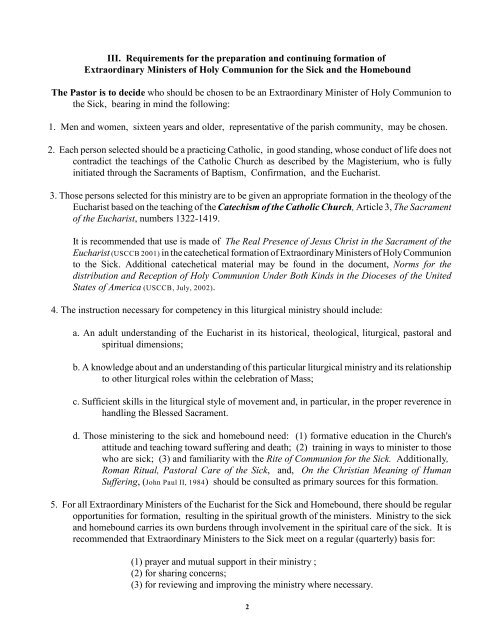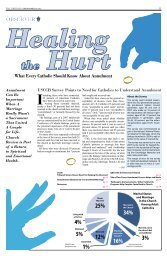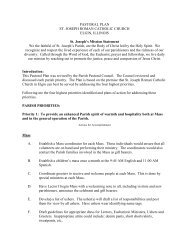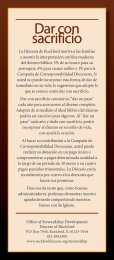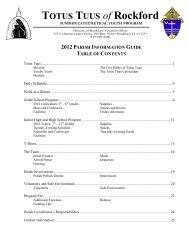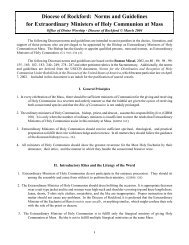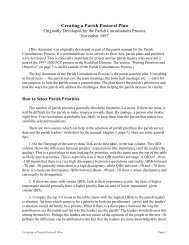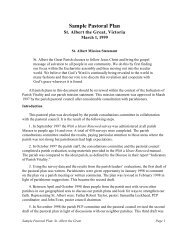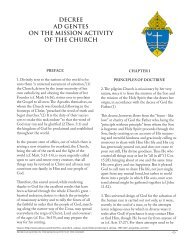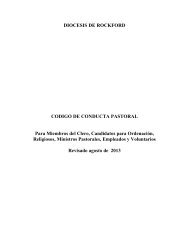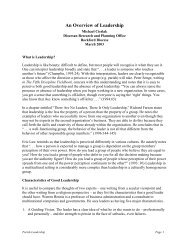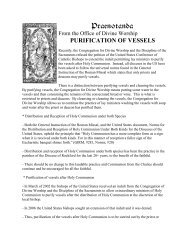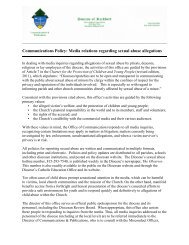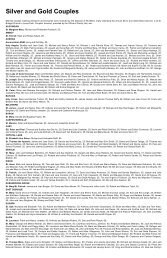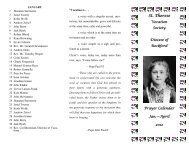Extraordinary Ministers of Holy Communion to the Sick - Diocese of ...
Extraordinary Ministers of Holy Communion to the Sick - Diocese of ...
Extraordinary Ministers of Holy Communion to the Sick - Diocese of ...
You also want an ePaper? Increase the reach of your titles
YUMPU automatically turns print PDFs into web optimized ePapers that Google loves.
III. Requirements for <strong>the</strong> preparation and continuing formation <strong>of</strong><br />
<strong>Extraordinary</strong> <strong>Ministers</strong> <strong>of</strong> <strong>Holy</strong> <strong>Communion</strong> for <strong>the</strong> <strong>Sick</strong> and <strong>the</strong> Homebound<br />
The Pas<strong>to</strong>r is <strong>to</strong> decide who should be chosen <strong>to</strong> be an <strong>Extraordinary</strong> Minister <strong>of</strong> <strong>Holy</strong> <strong>Communion</strong> <strong>to</strong><br />
<strong>the</strong> <strong>Sick</strong>, bearing in mind <strong>the</strong> following:<br />
1. Men and women, sixteen years and older, representative <strong>of</strong> <strong>the</strong> parish community, may be chosen.<br />
2. Each person selected should be a practicing Catholic, in good standing, whose conduct <strong>of</strong> life does not<br />
contradict <strong>the</strong> teachings <strong>of</strong> <strong>the</strong> Catholic Church as described by <strong>the</strong> Magisterium, who is fully<br />
initiated through <strong>the</strong> Sacraments <strong>of</strong> Baptism, Confirmation, and <strong>the</strong> Eucharist.<br />
3. Those persons selected for this ministry are <strong>to</strong> be given an appropriate formation in <strong>the</strong> <strong>the</strong>ology <strong>of</strong> <strong>the</strong><br />
Eucharist based on <strong>the</strong> teaching <strong>of</strong> <strong>the</strong> Catechism <strong>of</strong> <strong>the</strong> Catholic Church, Article 3, The Sacrament<br />
<strong>of</strong> <strong>the</strong> Eucharist, numbers 1322-1419.<br />
It is recommended that use is made <strong>of</strong> The Real Presence <strong>of</strong> Jesus Christ in <strong>the</strong> Sacrament <strong>of</strong> <strong>the</strong><br />
Eucharist (USCCB 2001) in <strong>the</strong> catechetical formation <strong>of</strong> <strong>Extraordinary</strong> <strong>Ministers</strong> <strong>of</strong> <strong>Holy</strong> <strong>Communion</strong><br />
<strong>to</strong> <strong>the</strong> <strong>Sick</strong>. Additional catechetical material may be found in <strong>the</strong> document, Norms for <strong>the</strong><br />
distribution and Reception <strong>of</strong> <strong>Holy</strong> <strong>Communion</strong> Under Both Kinds in <strong>the</strong> <strong>Diocese</strong>s <strong>of</strong> <strong>the</strong> United<br />
States <strong>of</strong> America (USCCB, July, 2002).<br />
4. The instruction necessary for competency in this liturgical ministry should include:<br />
a. An adult understanding <strong>of</strong> <strong>the</strong> Eucharist in its his<strong>to</strong>rical, <strong>the</strong>ological, liturgical, pas<strong>to</strong>ral and<br />
spiritual dimensions;<br />
b. A knowledge about and an understanding <strong>of</strong> this particular liturgical ministry and its relationship<br />
<strong>to</strong> o<strong>the</strong>r liturgical roles within <strong>the</strong> celebration <strong>of</strong> Mass;<br />
c. Sufficient skills in <strong>the</strong> liturgical style <strong>of</strong> movement and, in particular, in <strong>the</strong> proper reverence in<br />
handling <strong>the</strong> Blessed Sacrament.<br />
d. Those ministering <strong>to</strong> <strong>the</strong> sick and homebound need: (1) formative education in <strong>the</strong> Church's<br />
attitude and teaching <strong>to</strong>ward suffering and death; (2) training in ways <strong>to</strong> minister <strong>to</strong> those<br />
who are sick; (3) and familiarity with <strong>the</strong> Rite <strong>of</strong> <strong>Communion</strong> for <strong>the</strong> <strong>Sick</strong>. Additionally,<br />
Roman Ritual, Pas<strong>to</strong>ral Care <strong>of</strong> <strong>the</strong> <strong>Sick</strong>, and, On <strong>the</strong> Christian Meaning <strong>of</strong> Human<br />
Suffering, (John Paul II, 1984) should be consulted as primary sources for this formation.<br />
5. For all <strong>Extraordinary</strong> <strong>Ministers</strong> <strong>of</strong> <strong>the</strong> Eucharist for <strong>the</strong> <strong>Sick</strong> and Homebound, <strong>the</strong>re should be regular<br />
opportunities for formation, resulting in <strong>the</strong> spiritual growth <strong>of</strong> <strong>the</strong> ministers. Ministry <strong>to</strong> <strong>the</strong> sick<br />
and homebound carries its own burdens through involvement in <strong>the</strong> spiritual care <strong>of</strong> <strong>the</strong> sick. It is<br />
recommended that <strong>Extraordinary</strong> <strong>Ministers</strong> <strong>to</strong> <strong>the</strong> <strong>Sick</strong> meet on a regular (quarterly) basis for:<br />
(1) prayer and mutual support in <strong>the</strong>ir ministry ;<br />
(2) for sharing concerns;<br />
(3) for reviewing and improving <strong>the</strong> ministry where necessary.<br />
2


